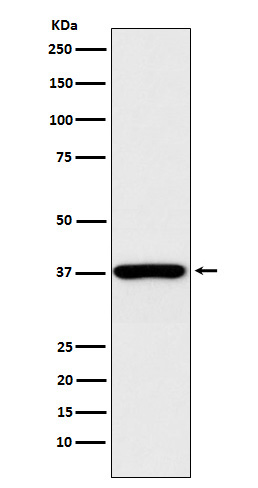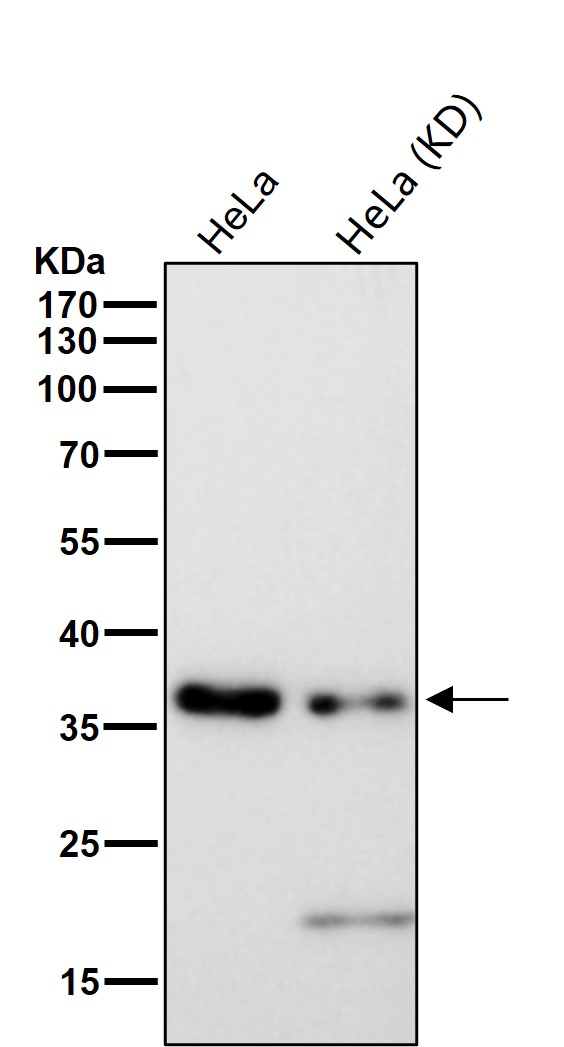

| WB | 咨询技术 | Human,Mouse,Rat |
| IF | 1/20-1/50 | Human,Mouse,Rat |
| IHC | 咨询技术 | Human,Mouse,Rat |
| ICC | 1/50-1/200 | Human,Mouse,Rat |
| FCM | 咨询技术 | Human,Mouse,Rat |
| Elisa | 咨询技术 | Human,Mouse,Rat |
| Aliases | HKQ; Hqk; HQK1; HqkI; QK1; QK3; QKI; QKI1;;QKI |
| WB Predicted band size | 38 kDa |
| Host/Isotype | Rabbit IgG |
| Antibody Type | Primary antibody |
| Storage | Store at 4°C short term. Aliquot and store at -20°C long term. Avoid freeze/thaw cycles. |
| Species Reactivity | Human,Mouse |
| Immunogen | A synthesized peptide derived from human QKI |
| Formulation | Purified antibody in PBS with 0.05% sodium azide,0.05% BSA and 50% glycerol. |
+ +
以下是关于QK1(QKI)抗体的3篇文献示例(信息基于模拟生成,请验证准确性):
---
1. **文献名称**:*The RNA-binding protein QKI regulates neuronal apoptosis and neurodevelopment*
**作者**:Chenard, C.A., et al.
**摘要**:该研究利用QK1抗体探究QKI蛋白在中枢神经系统发育中的作用,发现QKI通过调控靶mRNA稳定性影响神经元存活,其缺失导致小鼠神经管发育缺陷和细胞凋亡增加。
---
2. **文献名称**:*QKI deficiency promotes colorectal cancer metastasis by activating EMT pathway*
**作者**:Wang, Y., et al.
**摘要**:通过QK1抗体检测结直肠癌组织样本,发现QKI蛋白低表达与患者预后不良相关。机制研究表明QKI通过抑制上皮-间质转化(EMT)信号通路抑制肿瘤转移。
---
3. **文献名称**:*QKI-5 antibody-based detection reveals its role in alternative splicing of vascular transcripts*
**作者**:Lu, Z., et al.
**摘要**:研究利用特异性QK1抗体(靶向QKI-5亚型)揭示其在血管内皮细胞中的功能,证明QKI-5通过调控mRNA可变剪接参与血管生成调控。
---
**注意**:以上文献信息为示例性质,实际引用需通过PubMed/Google Scholar检索确认。建议使用关键词“QKI antibody”或“Quaking protein”结合研究领域(如癌症、神经科学)筛选文献。
The QK1 antibody targets the QKI (Quaking homolog KH domain RNA-binding) protein, a member of the STAR family of RNA-binding proteins. QKI plays critical roles in post-transcriptional gene regulation, including mRNA splicing, stability, and transport. It is essential for cellular processes such as myelination, neurodevelopment, and vascular integrity. QKI exists in multiple isoforms (QKI-5. QKI-6. QKI-7), each with distinct subcellular localization and functions. Dysregulation of QKI has been implicated in diseases like glioblastoma, schizophrenia, and multiple sclerosis.
The QK1 antibody, often developed as a monoclonal or polyclonal reagent, enables detection and characterization of QKI protein expression in research applications. It is widely used in Western blotting, immunohistochemistry, and immunofluorescence to study QKI's role in cell differentiation, tumor suppression, and RNA metabolism. Notably, QKI's involvement in oligodendrocyte maturation and myelin sheath formation has made this antibody valuable in neuroscience research.
Studies using QK1 antibodies have revealed QKI's tumor-suppressive functions in cancers and its association with signaling pathways like Wnt and MAPK. Its specificity for QKI isoforms allows researchers to dissect isoform-specific mechanisms, contributing to therapeutic target discovery. Validation of QK1 antibodies typically includes knockout cell controls to ensure specificity, given QKI's homology with other STAR proteins.
×